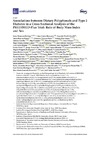Identificador persistente para citar o vincular este elemento:
https://accedacris.ulpgc.es/jspui/handle/10553/70145
| Título: | Associations between dietary polyphenols and type 2 diabetes in a cross-sectional analysis of the PREDIMED-Plus trial: Role of body mass index and sex | Autores/as: | Tresserra-Rimbau, Anna Castro-Barquero, Sara Vitelli-Storelli, Facundo Becerra-Tomas, Nerea Vázquez-Ruiz, Zenaida Díaz-López, Andrés Corella, Dolores Castañer, Olga Romaguera, Dora Vioque, Jesús Alonso-Gómez, Ángel María Wärnberg, Julia Martínez, José Alfredo Serra Majem, Luis Estruch, Ramon Tinahones, Francisco José Lapetra, José Pintó, Xavier Tur, Josep Antoni López-Miranda, José García-Molina, Laura Delgado-Rodríguez, Miguel Matía-Martín, Pilar Daimiel, Lidia Rubín-García, María Vidal, Josep Galdon, Alba Ros, Emilio Basterra-Gortari, Francisco Javier Babio, Nancy Sorlí, José Vicente Hernáez, Álvaro Konieczna, Jadwiga Notario-Barandiaran, Leyre Tojal-Sierra, Lucas Pérez-López, Jessica Abete, Itziar Álvarez-Pérez, Jacqueline Fernández-García, José Carlos Santos-Lozano, José Manuel Galera-Cusí, Ana Julibert, Alicia Ruiz-Canela, Miguel Martinez-Lacruz, Raul Pérez-Vega, Karla Alejandra Galmes-Panades, Aina María Pastor-Polo, Concepción Moreno-Rodriguez, Anai Gea, Alfredo Fitó, Montserrat Lamuela-Raventós, Rosa María Salas-Salvadó, Jordi |
Clasificación UNESCO: | 32 Ciencias médicas | Palabras clave: | Catechins Diet Flavonoids Hydroxybenzoic Acids Hydroxycinnamic Acids, et al. |
Fecha de publicación: | 2019 | Proyectos: | Efecto de la Dieta Mediterránea Hopocalórica y Promoción de la Actividad Física en Prevención Primaria Cardiovascular.Estudio Piloto Sobre Marcadores Intermedios. Efecto de Una Pérdida de Peso Con Dieta Mediterránea Hipocalórica y Promoción de la Actividad Física en la Prevención Primaria Cardiovascular Sistema Inmune Inespecífico en Dorada (Sparus Aurata): Activación Del Sistema Interferón y Papel de la Actividad Bh4. Pi042004/153 Neuroprotección Por Bloqueo de la Capacidad de Transactivadora Nf-Kb y Factores Relacionados. |
Publicación seriada: | Antioxidants | Resumen: | Overweight and obesity are important risk factors for type 2 diabetes (T2D). Moving towards healthier diets, namely, diets rich in bioactive compounds, could decrease the odds of suffering T2D. However, those individuals with high body mass index (BMI) may have altered absorption or metabolism of some nutrients and dietary components, including polyphenols. Therefore, we aimed to assess whether high intakes of some classes of polyphenols are associated with T2D in a population with metabolic syndrome and how these associations depend on BMI and sex. This baseline cross-sectional analysis includes 6633 participants from the PREDIMED-Plus trial. Polyphenol intakes were calculated from food frequency questionnaires (FFQ). Cox regression models with constant time at risk and robust variance estimators were used to estimate the prevalence ratios (PRs) for polyphenol intake and T2D prevalence using the lowest quartile as the reference group. Analyses were stratified by sex and BMI groups (overweight and obese) to evaluate potential effect modification. Catechins, proanthocyanidins, hydroxybenzoic acids, and lignans were inversely associated with T2D. Hydroxycinnamic acids were directly related in men. These associations were different depending on sex and BMI, that is, women and overweight obtained stronger inverse associations. | URI: | https://accedacris.ulpgc.es/handle/10553/70145 | ISSN: | 2076-3921 | DOI: | 10.3390/antiox8110537 | Fuente: | Antioxidants [ISSN 2076-3921] v. 8 (11), (Noviembre 2019) |
| Colección: | Artículos |
Citas SCOPUSTM
35
actualizado el 08-jun-2025
Citas de WEB OF SCIENCETM
Citations
37
actualizado el 01-feb-2026
Visitas
75
actualizado el 10-ene-2026
Descargas
71
actualizado el 10-ene-2026
Google ScholarTM
Verifica
Altmetric
Comparte
Exporta metadatos
Los elementos en ULPGC accedaCRIS están protegidos por derechos de autor con todos los derechos reservados, a menos que se indique lo contrario.
